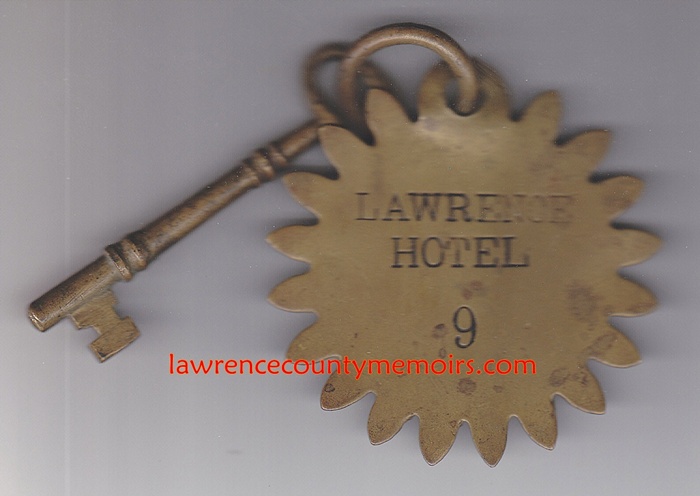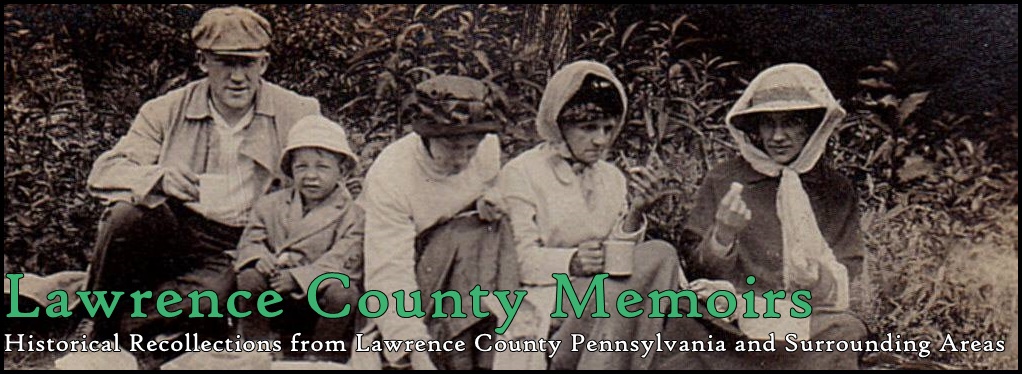In 1889 local industrialist Henry W. Hartman (1850-1913), who previously owned a steel plant and other interests in nearby Beaver Falls, made plans to begin a new settlement along southern banks of the Connoquenessing Creek just within the confines of Lawrence County. He organized and served as the President of the Pittsburgh Company, a corporation that purchased the land and would oversee all aspects of the construction and growth of the town. Hartman envisioned his new settlement, which he named Ellwood after barbed wire pioneer Isaac L. Ellwood – and later lengthened to Ellwood City, as a major manufacturing center.
Hartman knew it would take time to build up Ellwood as an industrial mecca, so in the meantime he played up the idea that his new settlement could serve as a resort area for hardworking folks from western Pennsylvania. Among his first projects was the building of a luxury hotel and the establishment of a nature retreat along the Connoquenessing Creek known as Glen Park.
Ground was first broken after the winter thaw of 1890 and one of the first structures to be built in Ellwood City was the Hotel Oliver. The building site was situated at the end of Fifth Street (on Crescent Avenue) and had a commanding view of the Connoquenessing Creek gorge and neighboring Hazel Dell.
The hotel was named in honor of steel industry giant Henry W. Oliver (1840-1904), who was born in Ireland, immigrated to Pittsburgh with his family when he was a youngster, served in the Civil War, got involved in the coal, railroad, and steel industries, and helped found the Oliver Iron & Steel Company in 1888. Oliver’s interests mined the massive Mesabi Range in Minnesota and eventually served as the leading supplier of iron ore to powerful steel manufacturing companies owned by Andrew Carnegie, John D. Rockefeller, and J. P. Morgan. The 25-story Henry W. Oliver Building in downtown Pittsburgh, completed in 1910, is named in his honor.
The Hotel Oliver opened to the public in early May 1891 and Henry Oliver and a host of other dignitaries from Pittsburgh were on hand for the grand opening. The establishment cost about $45,000 (fully-furnished) and was a luxurious establishment complete with such amenities as electric lights, sanitary plumbing, and steam heat. It was surrounded by a large twelve-acre grove and picnic grounds known as Oliver Park, which included two cottages and a “t-shaped” out building (which opened in July 1891) containing a billiards room, bowling alley, and a few small apartments. Its bar and social lounge, a separate building connected to the rear of the main hotel structure, would become a favorite meeting place among the prominent men of Ellwood City.
At that same time a corporation known as the Ellwood City Hotel Company, initially led by Merritt Green, an executive to Hartman, was organized and soon formerly purchased the Hotel Oliver from the Pittsburgh Company for $80,000. John Lee of Philadelphia served as the first manager of the establishment, but immediately came to despise Ellwood City and vacated the post after only two weeks.
Records and newspaper articles on the actual ownership of this hotel are very confusing, as it seems the Pittsburg Company – through the Ellwood City Hotel Company – retained overall control of the venture.
Lee’s departure set a precedent and the management of the hotel changed hands frequently and subsequent managers over the next five years included L. B. North, William H. Koerner, Samuel A. Roefels, Thomas H. Brady, Bernard “Bernie” Blystone, Henry Straub, and William G. Clark. Many others followed in their footsteps.
Despite the high turnover of management things initially went well and the upscale hotel was the scene of many private events including dances, banquets, dinners, and alumni meetings. A constant battle to maintain a liquor license – and defending itself against claims of unauthorized sales of liquor – began to take its toll and a steady decline in business began in the early 1900’s.
The hotel was sold by the Hartman interests (Pittsburg Company) to a group of Pittsburgh businessman led by Elmer E. Cleveland in April 1905. (I believe this Elmer Cleveland may have been same man who played minor and major league baseball between 1884-1891, including with the Pittsburgh Allegheny’s in 1888.) The Lawrence County Sheriff actually closed the financially-strapped hotel and seized its contents in October 1905, until settlements were reached with several creditors a few weeks later.
The establishment, which began to make money again, was rebranded as the Lawrence Hotel in about 1906. Most modern-day accounts report this name change happened back in 1896, but old newspaper articles clearly show the name Oliver was associated with the business up until 1906. Soon after the name change took effect for good (in 1906) the hotel was formerly sold back to the Pittsburg Company in May 1907 for $60,000.
The hotel soon began a downturn again was sold to another group of Pittsburgh businessmen in 1911. At about the same time a temperance movement was dominating Lawrence County politics and the hotel and others like it were denied licenses to sell liquor. This and other restrictions brought about a severe financial loss and forced the hotel – which sold meals and replaced liquor with soda drinks – out of business by May 1913.
In June 1914 the property was sold for only $19,000 to the Ellwood City Board of Education, which made some modifications and dubbed it as the Lawrence Building. The first floor of the building became the home of the Ellwood City High School when the older students from the severely-crowded Central Public School transferred there. The Ellwood City public library also moved into the building, while the second floor of the former hotel was rented out as apartments.
A few years later school board officials starting discussions on building two new schoolhouses on the approximate site of the Lawrence Building. In mid-1923 construction began on a primary school, named the Hartman School in honor of Ellwood City’s founder, on property adjoining the Lawrence Building on the corner Fourth Street and Crescent Avenue. This building opened for classes in August 1924.
A few months later, in October 1924, the school board agreed to sell the Lawrence Building, including all of the lumber, to construction guru Joseph A. McCandless of Ellwood City for $1,025. McCandless soon had the former hotel and school building dismantled and carted away. Construction of a new high school building, later christened Lincoln High School in honor of the Sixteenth President of the United States, began soon after and was opened for classes in early September 1926. The short-lived Hotel Oliver/Lawrence Hotel – built to the finest specifications – was no more.
To read an excerpt (from a much longer article) about hotel manager John Lee applying for a liquor license in March 1891 click on: INITIAL LIQUOR LICENSE ARTICLE. To read a mention about African-Americans working in the hotel in June 1891 click on: COLORED GENTLEMEN MENTION. To read a mention about the hotel filled with many guests in late June 1891 click on: 200 GUESTS MENTION. To read about a gathering of county lawyers at the hotel in September 1891 click on: WHERE TALENT REIGNED SUPREME ARTICLE. To read the arrest of hotel manager Thomas Brady and his bartender in early 1895 click on: LIQUOR SELLERS ARTICLE. To read about a dance class held at the hotel in 1899 click on: DANCING CLASS HOP ARTICLE. Once again – as usual – hotel manager Arthur Krugeman was arrested in May 1901 under a charge of illegal liquor sales. To learn more the actual reason for the arrest click on: HOTEL MANAGER ARRESTED ARTICLE. To read a missing child that caused quite an uproar at the hotel in May 1902 click on: GREAT SCARE ARTICLE. To read a personal mention about former manager Thomas Brady returning to stay at the hotel in October 1902 click on: BRADY RETURNS MENTION. To read about the Pittsburg Company selling the hotel in early 1905 click on: NEW BUSINESS POLICY ARTICLE. To read two articles about the the hotel being seized by the County Sheriff in late 1905 click on: HOTEL SEIZED/FINANCIAL AFFAIRS ADJUSTED ARTICLES. To learn more about the situation in early 1911 concerning the fight over liquor sales and how it affected Ellwood City businesses click on: LIQUOR FIGHT ARTICLES and TWENTIER GOES TO MILWAUKEE ARTICLE. To read about a dance held at the hotel in February 1913 and organized by St. Agatha’s Church click on: RECEPTION AND DANCE ARRANGED ARTICLE. The annual meeting of the Lincoln High School alumni, scheduled for late May 1913 at the Hotel Lawrence, had to be postponed due to the closing of the hotel. To read more about it click on: ALUMNI WILL HOLD BANQUET ARTICLE. To read more about the school board deciding on whether to purchase the former hotel and property in June 1914 click on: WILL DECIDE ON SCHOOL HOUSE ARTICLE. To learn about the eventual fate of the building – subsequently used as a school from 1914-1924 – click on: LAWRENCE BUILDING SOLD ARTICLE.
 The dining room of the Hotel Oliver. (c1903) Full Size |
 In this updated postcard the name “Lawrence” now appears on the front facade. |  A c1906 view of Oliver Park which surrounds the hotel. This was the future site of Lincoln Junior-Senior High School. |
 The luxurious hotel, which underwent periodic financial difficulties during its twenty-two years of existence, was actually seized by the Lawrence County Sheriff in October 1905. A public auction of its contents was avoided when settlements were reached with several creditors a few weeks later. Full Size |
 A room key from old Lawrence Hotel in Ellwood City. |










Comments
johnnye #
hoteloliver
Comment